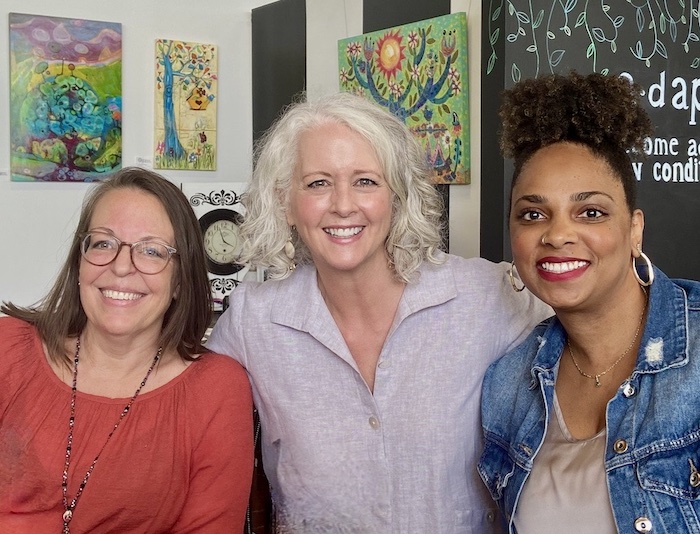from Julia Cameron, The Artist’s Way, pages 183-84
Creativity is not a business, although it may generate much business. An artist cannot replicate a prior success indefinitely. Those who attempt to work too long with formula, even their own formula, eventually leach themselves of their creative truths. Embedded as we often are in the business milieu of our art, it is tempting to guarantee what we cannot deliver: good work that duplicates the good work that has gone before.
. . . Painters pass through popular periods in their work and may be urged to linger there. For potters, composers, choreographers, the problem is the same. As artists we are asked to repeat ourselves and expand on the market we have built. Sometimes this is possible for us. Other times it’s not. . . .
Artists can and do responsibly meet the demands of their business partnerships. What is more difficult and more critical is for us as artists to continue to meet the inner demand of our own artistic growth. In short, as success comes to us, we must be vigilant. Any success postulated on a permanent artistic plateau dooms us, and it, to failure.



13 thoughts on “Deep Thought Thursday: Stuck in a rut?”
Thanks for the reminder Alyson. By the way, do you know how “deep Thought Thursday” started, where, who, how?
Hmmn. I like this quote a lot. Maybe I’ll have to break down and read that book!
I’ve been dealing recently with a little insecurity that makes me want to depend on some older work that had done well, work whose success I could count on as a given. I’m actively giving myself pep talks to trust the new work and quit falling back on the old. The old work isn’t quite where I’m at right now and I should be presenting the current me with confidence, right? Not always easy, but when I get up the courage to do it, I feel so much better about myself, so much more excited about what I’m doing. Too bad my husband’s not around anymore. Whenever I’d get too focused on a success, he’d just say, “Yeah, but what have you done lately?” Always stopped me in my tracks and got me back to work!
I love this last comment and the quote “yeah, but what have you done lately?” Maybe we should all write that on an index card and tape it on the studio wall to keep us going when the going gets tough and it’s tempting to fall back on easier stuff. I’ve often thought it must be very difficult to be very young when big, commercial success hits because the temptation to repeat yourself or risk losing all that approval (and money)must be huge and confusing. There is artistic freedom in anonymity, perhaps, due to limited expectations outside ourselves. I wonder what Van Gogh’s work might have looked like if he had been an instant financial success instead of living out his life as a struggling, unappreciated artist. Would his later, greater works ever have happened if he hadn’t been searching, searching, searching? I also think it’s interesting that the quote comes from Julia Cameron, who some might argue has repeated herself quite a bit in the last few years. It could be argued that her latest books are basically rewrites and elaborations of the Artist’s Way….
Alyson, I know you’ve always preached branding yourself, so as your work changes, do you recreate the brand as well? I still believe that once you have found some level of success with your art (whatever that is — see a previous “Deep Thought Thursday”), you can still pursue another different variance and still keep the old one running. Isn’t it possible to keep both threads loosely woven without becoming unravelled?.
I’d add to that saying the reverse warning. Changing what you do just for the sake of change is just as bad as being afraid to change. Follow the natural course of your art, whatever it is. Some musicians change their style with every album. Others spend a career refining and deepeing their understanding of one genre. Who’s to say which is right or wrong, except for the artist themself.
I really agree with Julia Cameron on this–we absolutely need to keep following our ideas, the directions that open up in the work, what excites us to keep going. That’s what it’s all about. Then trust that while the market for the work may shift and change over time, if you’re doing good work, consistent in quality if not form, there will always be a market for it. In other words, the marketing can be changed to suit the work, not the other way around–if a gallery just wants your old work, time to part ways.
Obviously all artists are different. Some take the approach of following their heart and inspiration with hope their collectors will follow or they find a market looking for what they offer. That is a legitimate philosophy and must bring great satisfaction when successful. Some artists, and I am in this camp, see the work as collaboration with the audience, much as an actor, singer or dancer might. My objective is to bring something to a collector that they will cherish and enjoy for a long time. I listen to my audience and as a result, consciously and subconsciously, adjust my work, I believe, in a fresh and creative way. This collaboration brings me great joy. Certainly there are many other philosophies to approaching the artist/audience relationship. Regardless of the philosophy, all working artists are in relationship to their audience in order to survive. Julia Cameron’s warning about success postulated on a permanent artistic plateau is true. But is the threat real? It sounds like the type of hyperbole designed to kick artist’s butts so they will continue to create fresh work, rather than a warning of a real trap. Most of us who are just trying, some struggling, to be self sufficient by means of our art would feel very fortunate if our work was in such high demand that the type of permanent artistic stagnation Cameron warns against would be a real temptation.
Perhaps the problem is when the stagnation is rooted in fear. Fear that if we move forward, we will leave our fans behind. If the need for external approval of our work….adoration, money, etc….can become a dependency that disconnects us with our inner voice. What is that we want to make? If we stay in a place, and perhaps go deeper, as long as it is because that is what we want to explore, no harm done.
I’ve seen artists who look the same even though the subject matter might be new. It’s boring and one does wonder have they lost their creative side. My husband also an artist is always evolving (age 80) and maintains his high standards, his clients look forward and purchase the latest. Any one time there are a limited amount of oils available, and patrons know this. I on the other hand do depend on the current trends and have nich which pays the bills. Whenever I start one of those paintings he is always reminding me “An Artist is only as good has his last piece. ”
Casey: Get the book from the library. Sheila: It sounds like a phase. Keep doing the work! Sheila & Mary: This quote: “yeah, but what have you done lately?” is kind of like the one from Breakfast at Tiffany’s when Holly asks Paul what he’s written lately. Ouch. Mary: Yep, Cameron has found the formula. I think it’s a publishing phenomenon. Everyone is doing that: writing and rewriting the same book over and over. But the quote IS from her first one.
Tracy: I think that there is one body of work (artist or not) that will make your name. After that, it’s a little easier to regroup and change the “brand.” Daniel: Interesting take. But do you think some people need to change for change’s sake? That they just have to do it in order to reinvigorate? Rebecca: Yep. As I said in my previous comment, just keep doing the work. Michael: Whoa. That’s deep. I think I’m going to have to ponder your comments more deeply.
I think I get Micheal’s comment: If we really listen to our audience, then we can not help but be changed, if not through a conscious decision of our own, then subconsciously, and it will likely show up in our work.